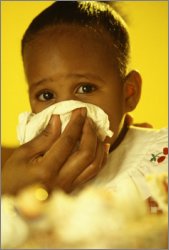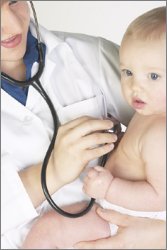Whooping Cough is Back: What are the Symptoms, Who is at Risk, How to Avoid It
by www.SixWise.com
Whooping cough, or pertussis, is a serious bacterial infection
of the lining of the breathing passages. The characteristic
symptom is a prolonged coughing spasm that leads to a labored
inhalation, which causes a high-pitched whooping sound.
|

Early symptoms of whooping cough resemble those of
the common cold, but after a week or two the symptoms
become more severe.
|
Prior to the 1940s, whooping cough was responsible for over
a quarter of a million serious illnesses and about 10,000
deaths per year. However, a vaccination campaign was introduced
and the illness declined to a low of just 1,010 reported cases
in 1976.
Since then, whooping cough appears to be making a comeback.
In 2004, there were more than 25,000 cases, according to the
American Academy of Pediatrics, but experts say the number
could be as high as 600,000 cases, as early symptoms of whooping
cough are often mistaken for other illnesses.
Whooping Cough Signs and Symptoms
Whooping cough is caused by bacteria called Bordetella pertussis,
and is very contagious. Typically, it's spread by breathing
in infected respiratory droplets from an infected person's
coughs or sneezes. Symptoms may show up within three to 12
days of exposure.
The early symptoms, which can last up to two weeks, are easy
to miss, as they're generally mild and resemble those of the
common cold:
-
Runny nose, sneezing, nasal congestion
-
Red, watery eyes
-
Dry cough
-
Mild fever
-
General malaise and loss of appetite
The later symptoms become more severe, and in adults can
resemble the symptoms of bronchitis:
-
Coughing attacks that end with a high-pitched whooping
sound upon inhalation, and bring up thick phlegm
-
Coughing attacks can be severe enough to cause vomiting,
bulging eyes, face discoloration and the tongue to protrude
-
Inflammation that narrows breathing tubes in your lungs,
causing you to gasp for air
-
Fatigue due to coughing spasms
Who's at Risk of Whooping Cough?
|

Health care officials recommend infants receive the
DtaP vaccine (pertussis, diphtheria and tetanus) to
prevent whooping cough. There have been reports of brain
damage after the vaccine, however, and research into
a potential link is ongoing.
|
The whooping cough vaccine wears off after childhood, leaving
teenagers and adults susceptible to the illness if an outbreak
occurs. Also, children don't become immune until they've received
at least three shots of the vaccine, which means infants 6
months and younger are at risk.
Children under 1 year have the most severe symptoms from
whooping cough, while teens and adults usually contract milder
cases. Likewise, while adults and teens usually recover from
whooping cough without any complications, children, and especially
those under 2, can experience severe, life-threatening complications,
including:
-
Injury to chest wall muscles or hernia (from severe coughing)
-
Ear infections
-
Pneumonia and slowed or stopped breathing
-
Dehydration
-
Seizures and brain damage
How to Avoid Whooping Cough
Health care official recommend the pertussis vaccine for
infants and children, as well as booster vaccines for teens
and adults, to prevent contracting the illness.
There is some concern that the pertussis vaccine may cause
neurologic damage, as some children have developed brain damage
after receiving the immunizations. Research into this issue
is being conducted, and children with seizures or brain disorders
are sometimes advised not to receive the DtaP vaccine (the
pertussis vaccine is usually given as a three-in-one vaccine,
along with diphtheria and tetanus).
If you suspect you or your child has whooping cough, you
should seek medical attention. Although they cannot cure whooping
cough, antibiotics are sometimes given to shorten the duration
of symptoms. For babies under 2 months, hospitalization is
often required. Meanwhile, if you are being treated for whooping
cough at home, these simple tips can help:
-
Get lots of rest.
-
Drink a lot of fluids, such as water and soup broths.
-
Eat smaller meals more frequently (instead of fewer,
larger meals) to avoid vomiting after coughing.
-
Use a mist vaporizer in your room, or take a hot shower
or bath, to help soothe the lungs and loosen phlegm.
- Keep the air in your home clean by not smoking and consider
the use of an air purifier.
Recommended Reading
Chronic
Sinusitis: What it is, What the Symptoms Are, Common Treatments,
Potential Cures
You
are Burying Your Face in a Hot Zone for Fungal Spores Every
Night: Your Pillow
Sources
MayoClinic.com
MedLine
Plus: Whooping Cough
Medem
Medical Library